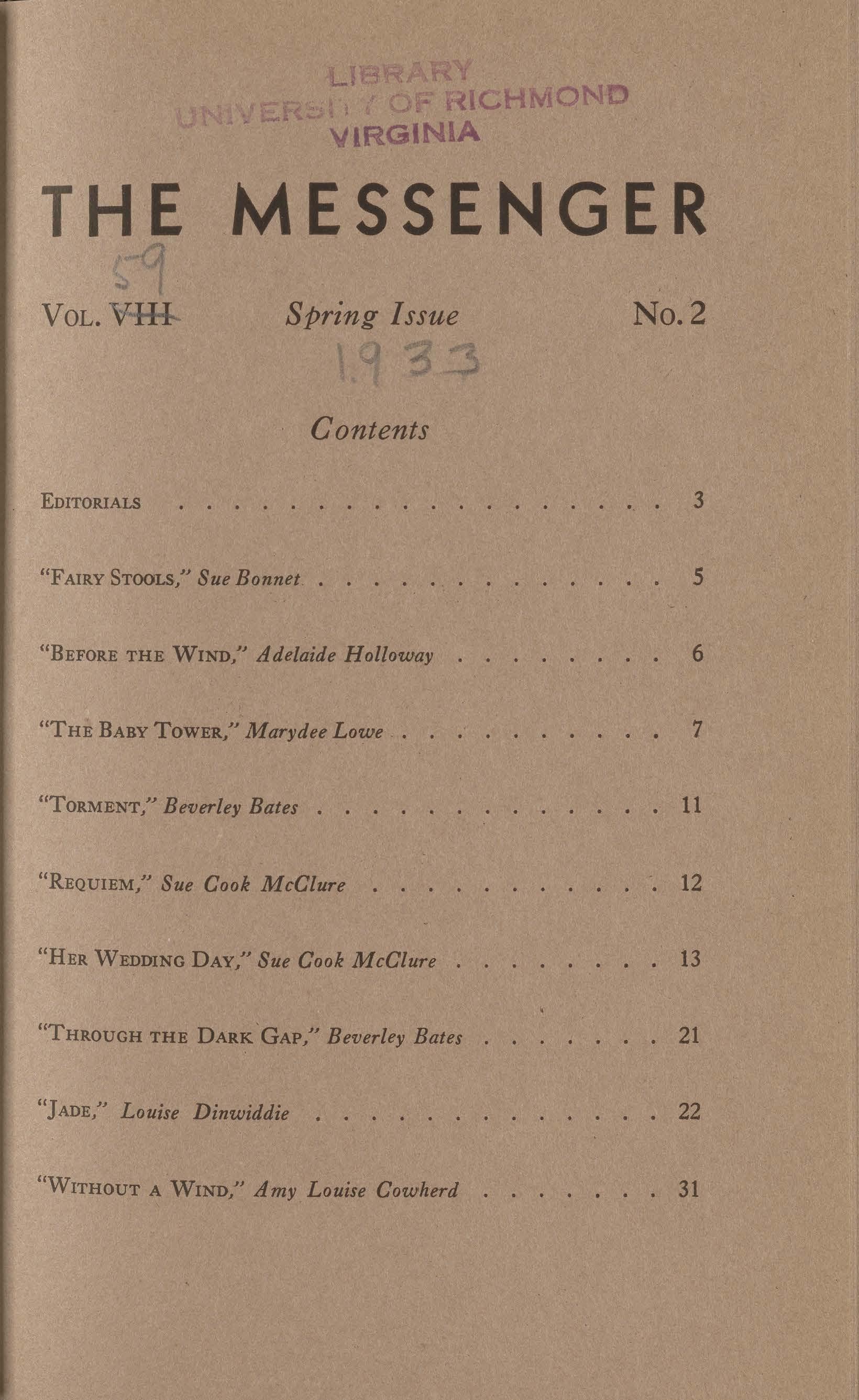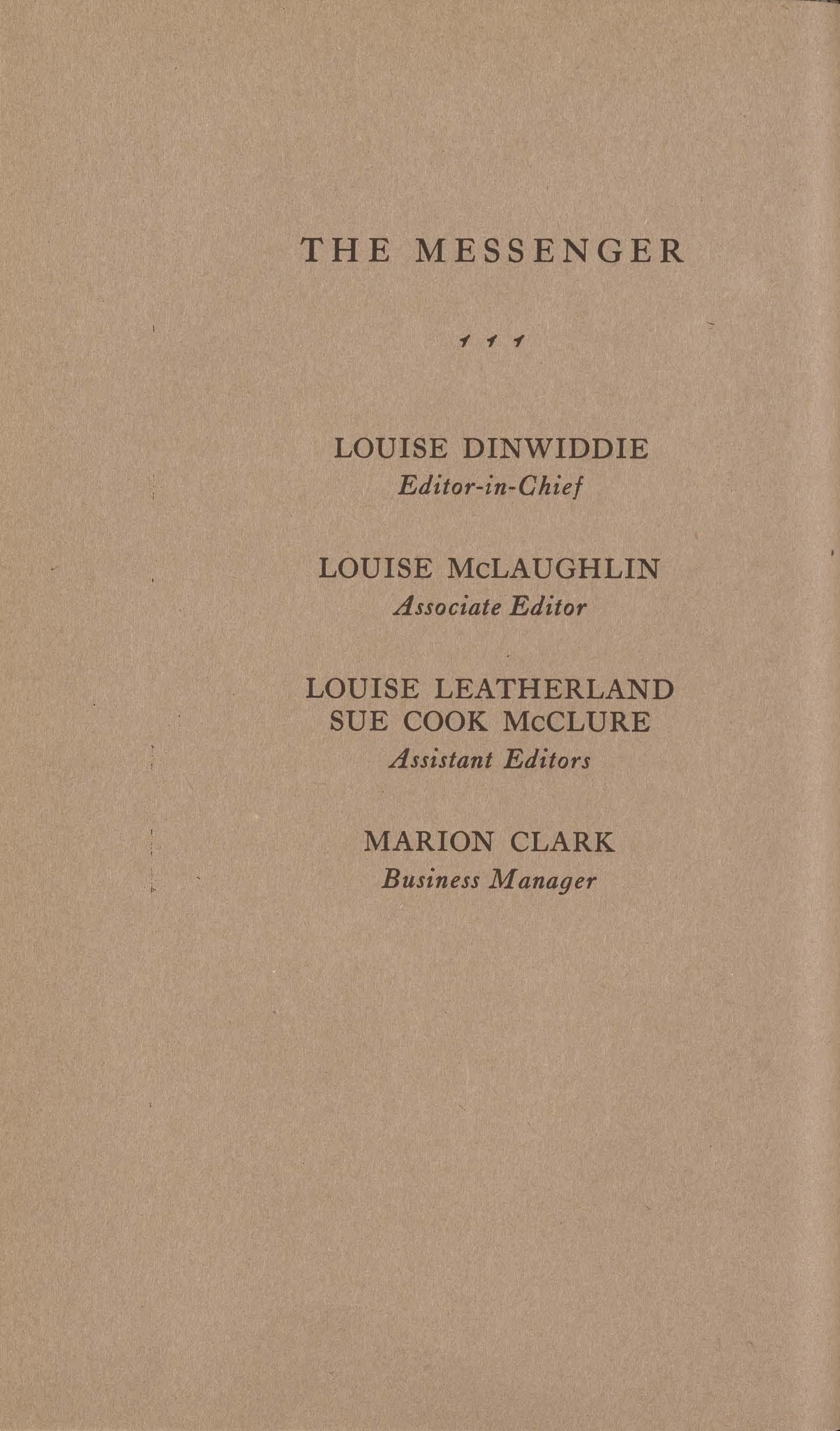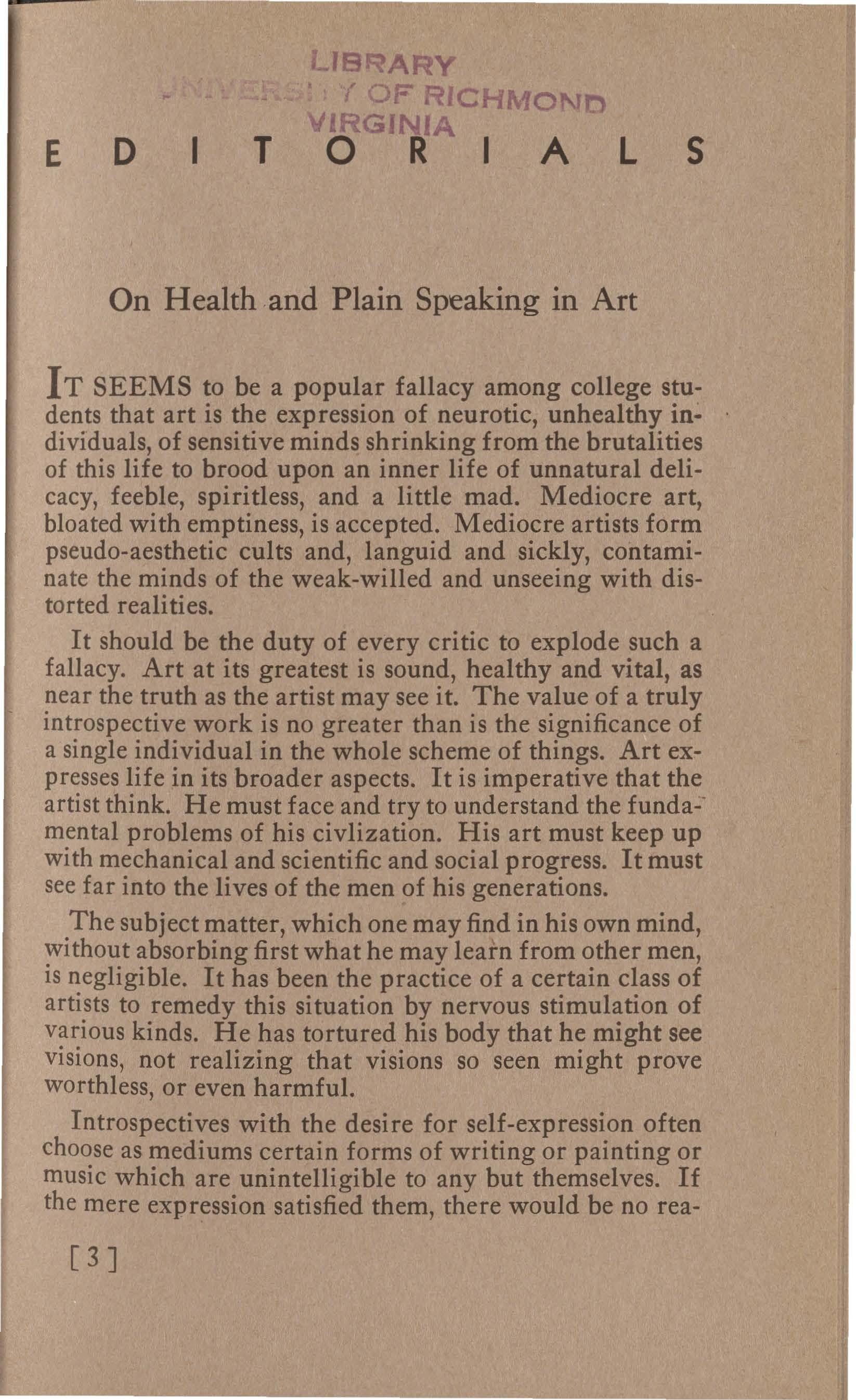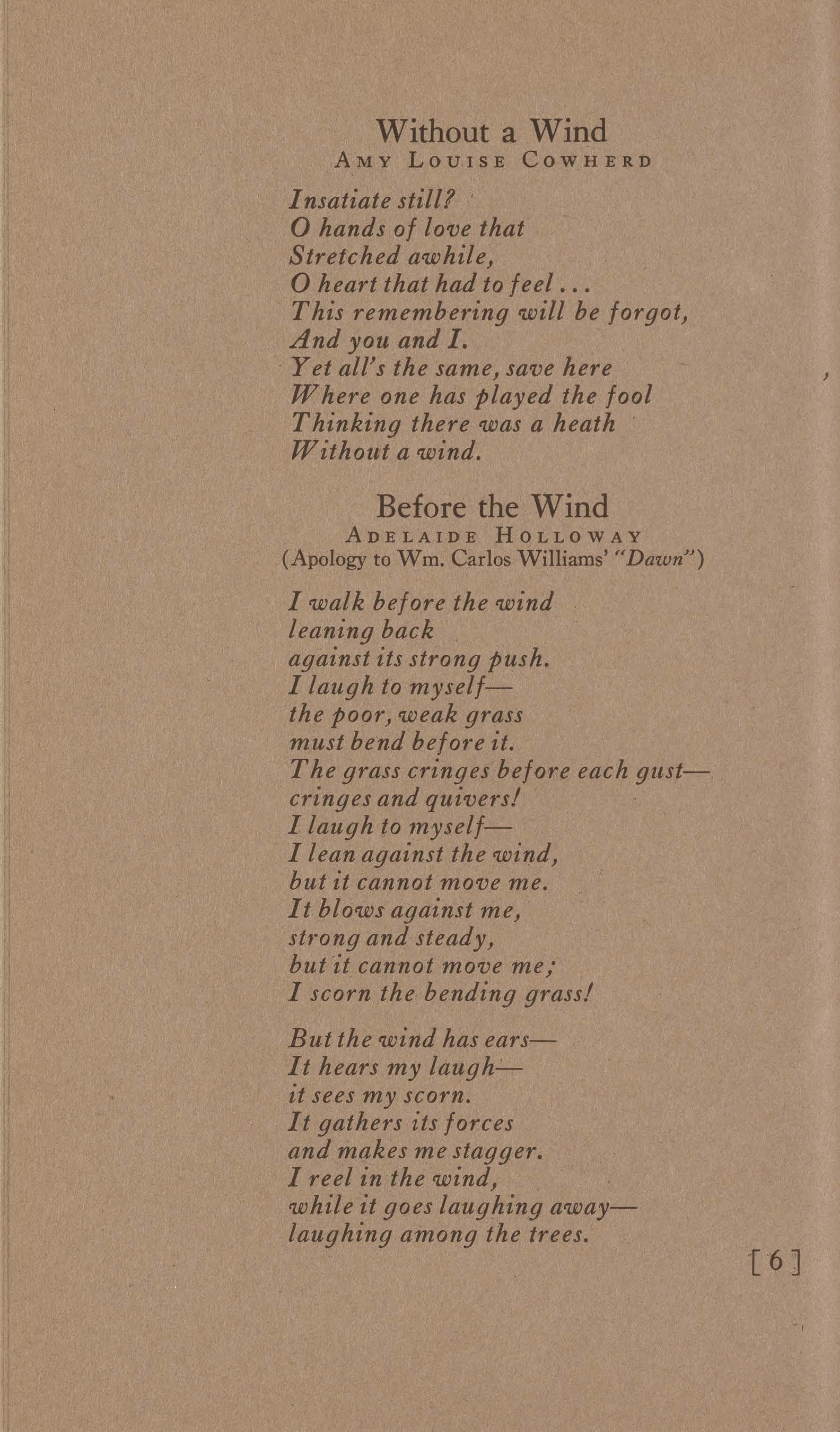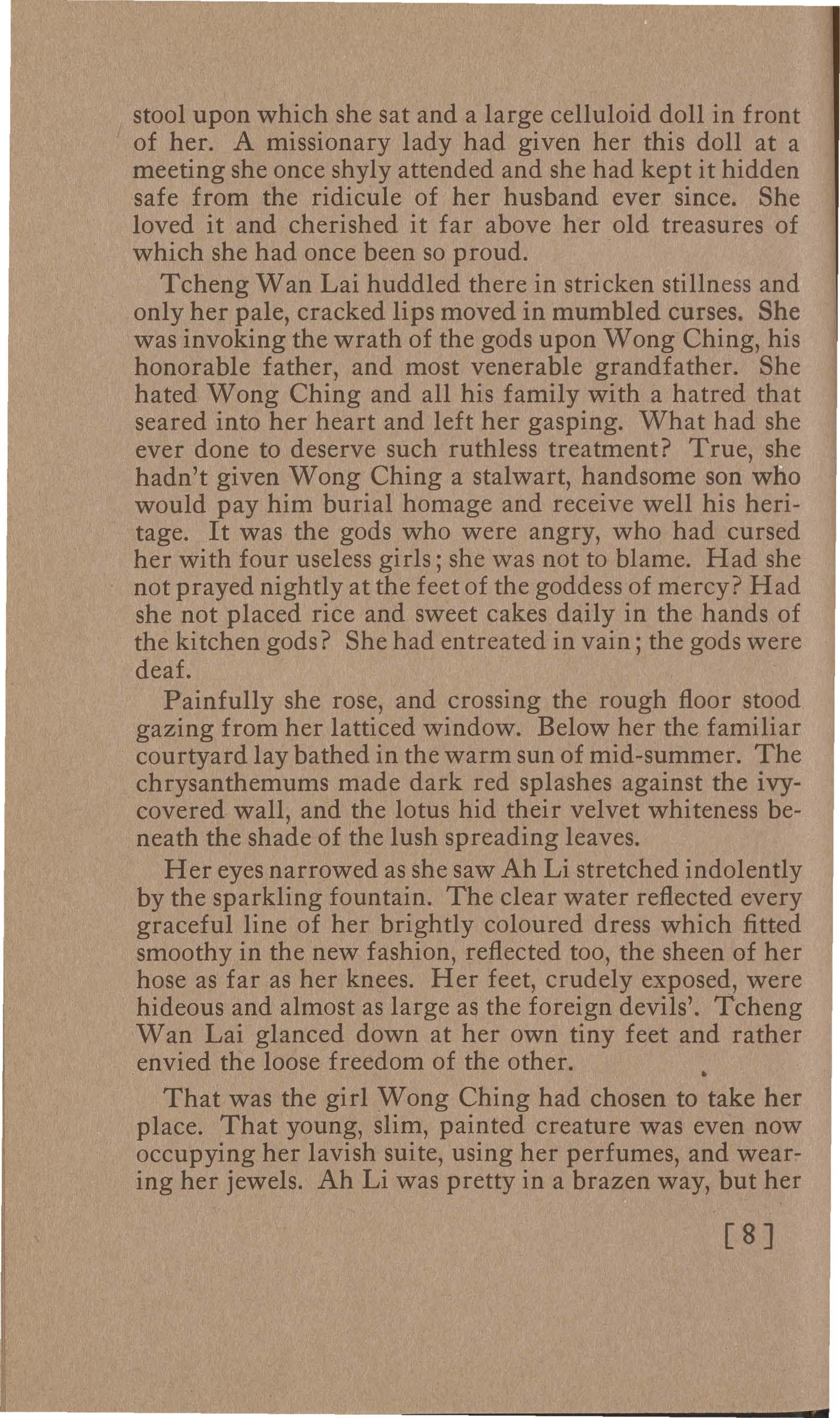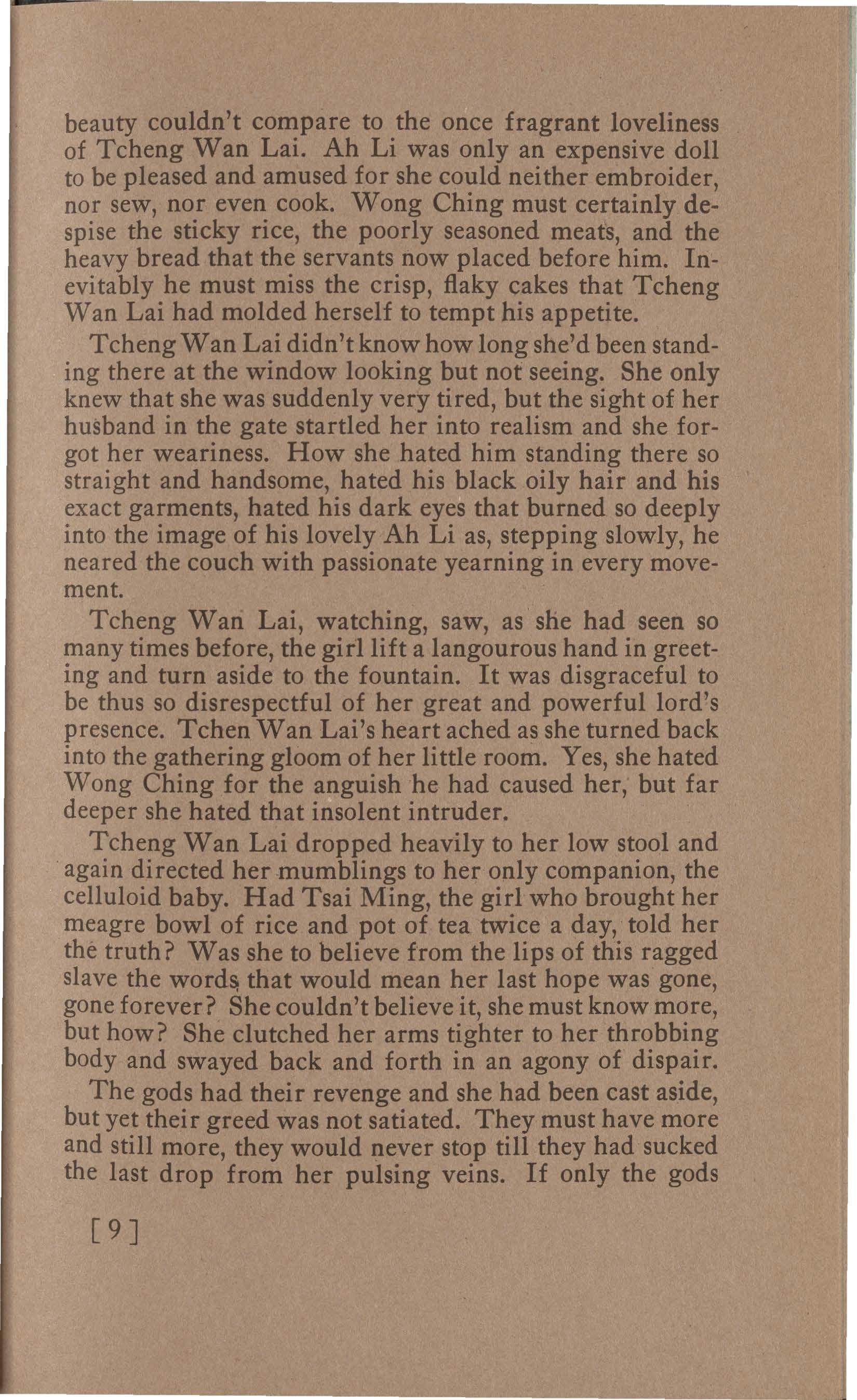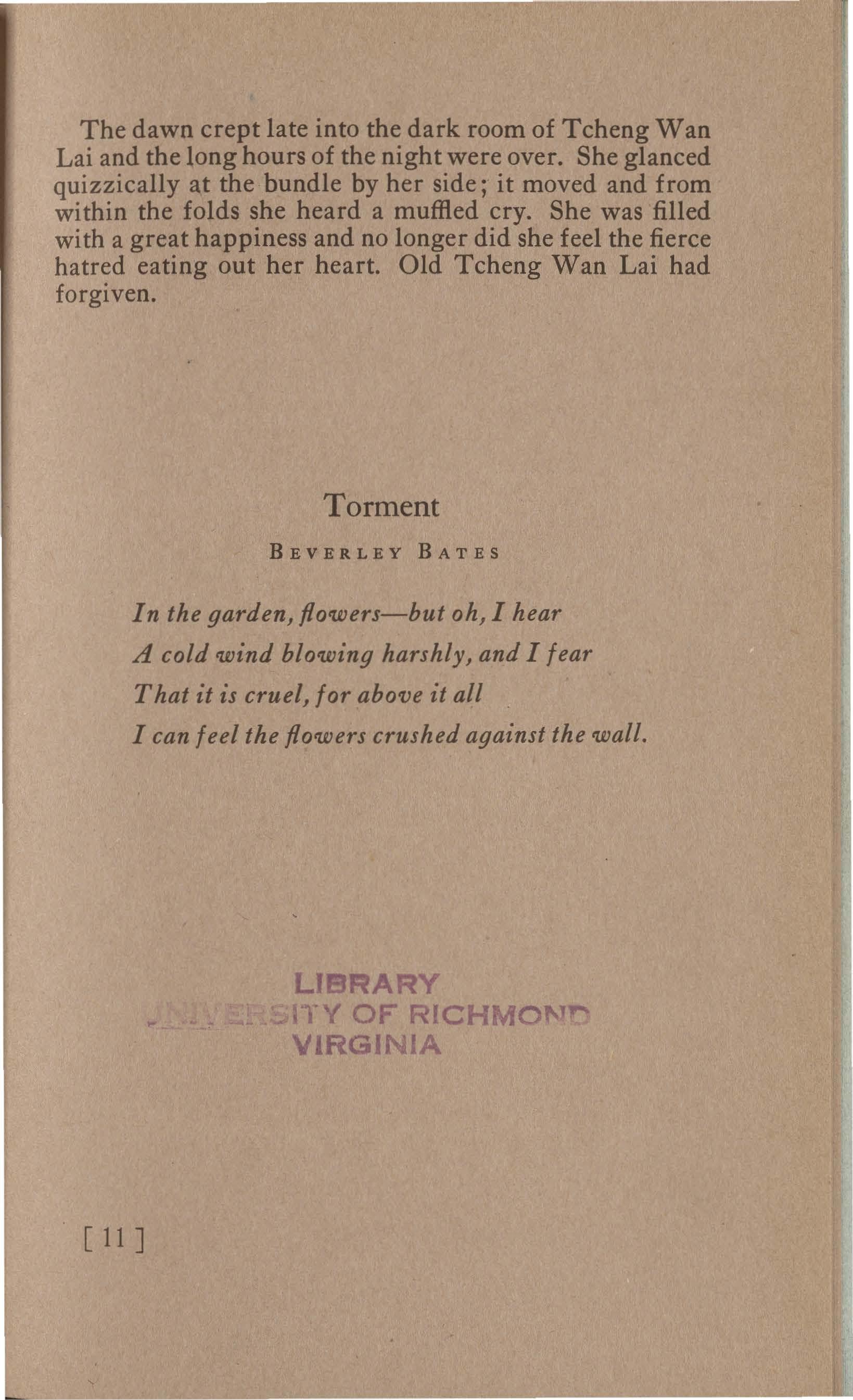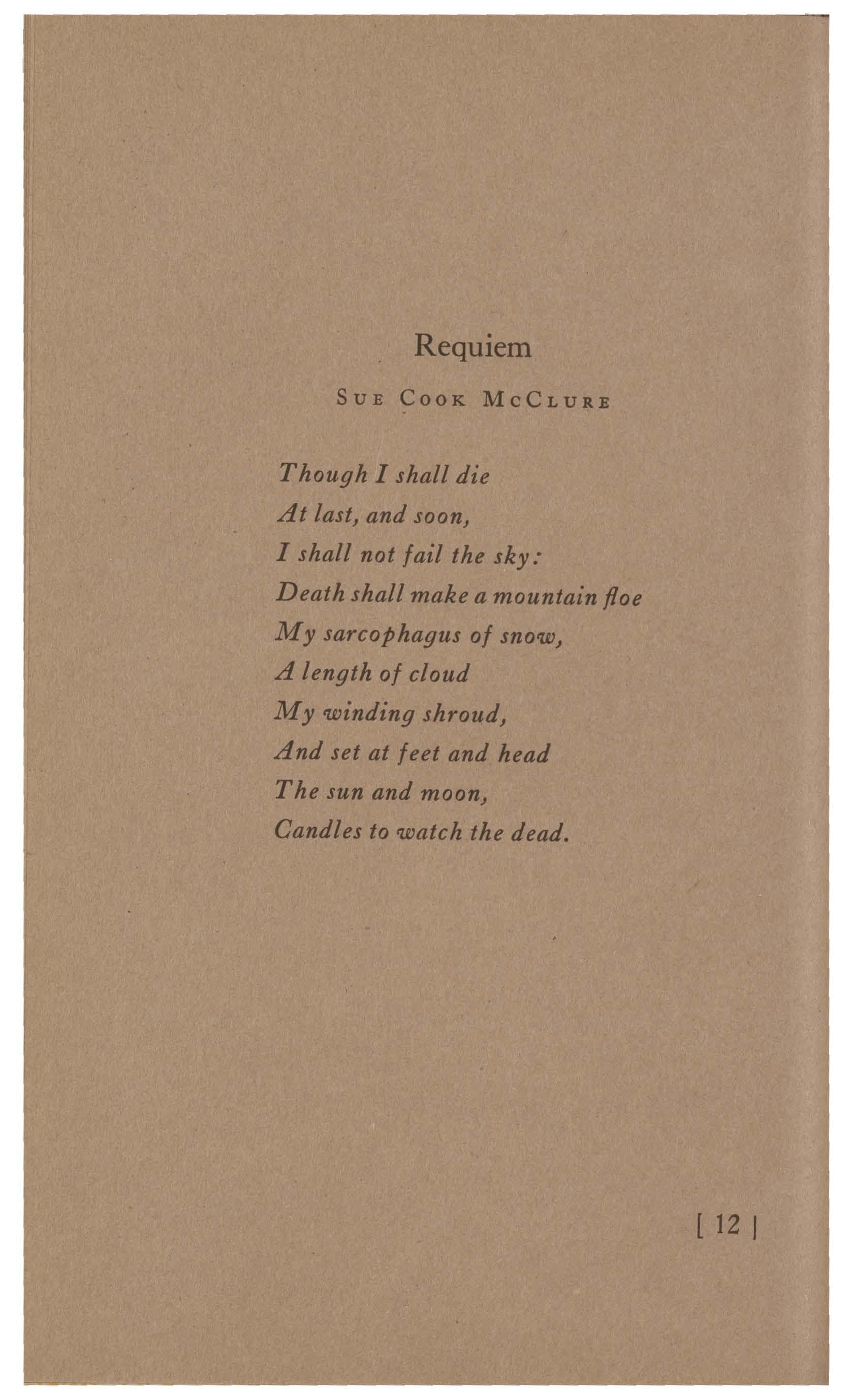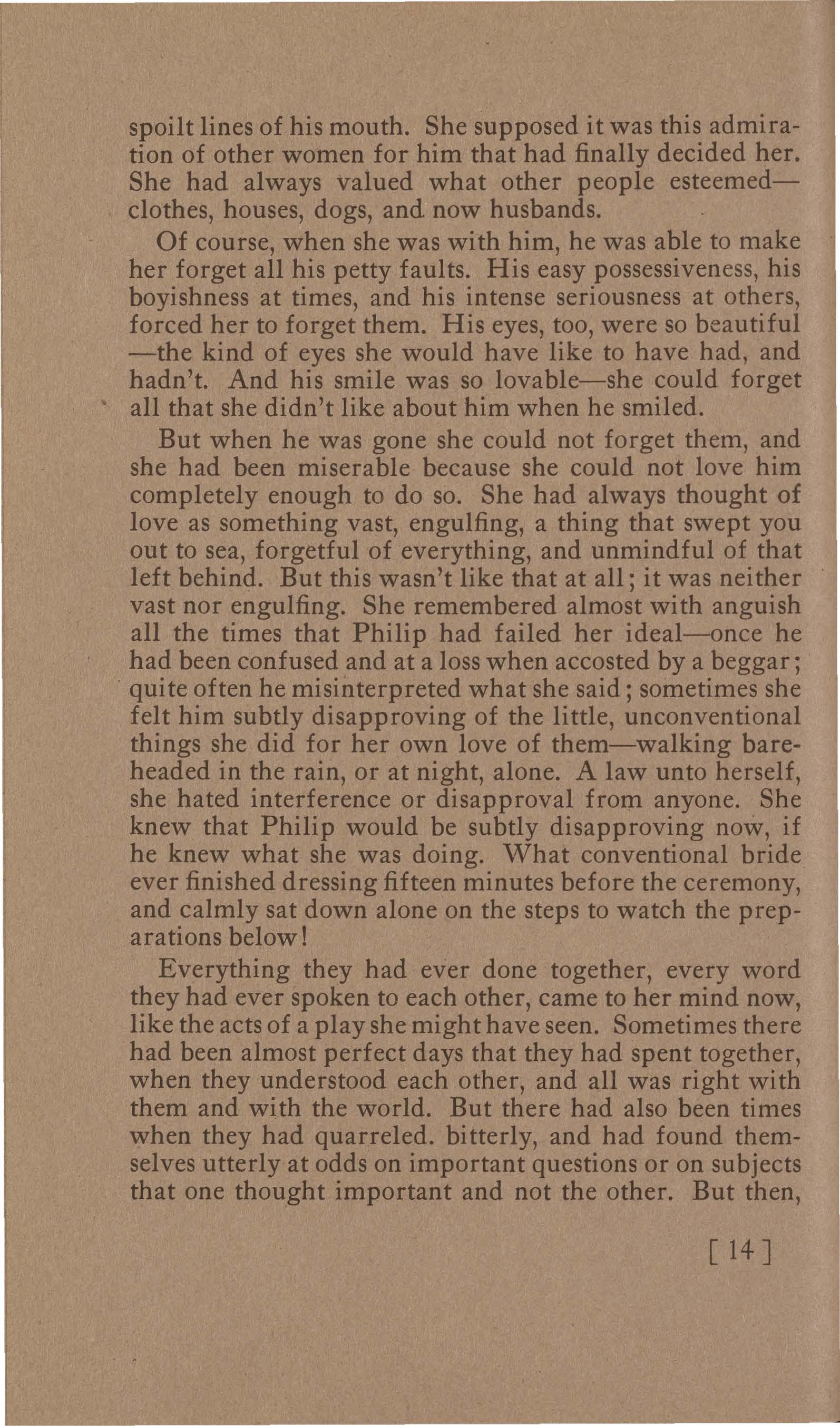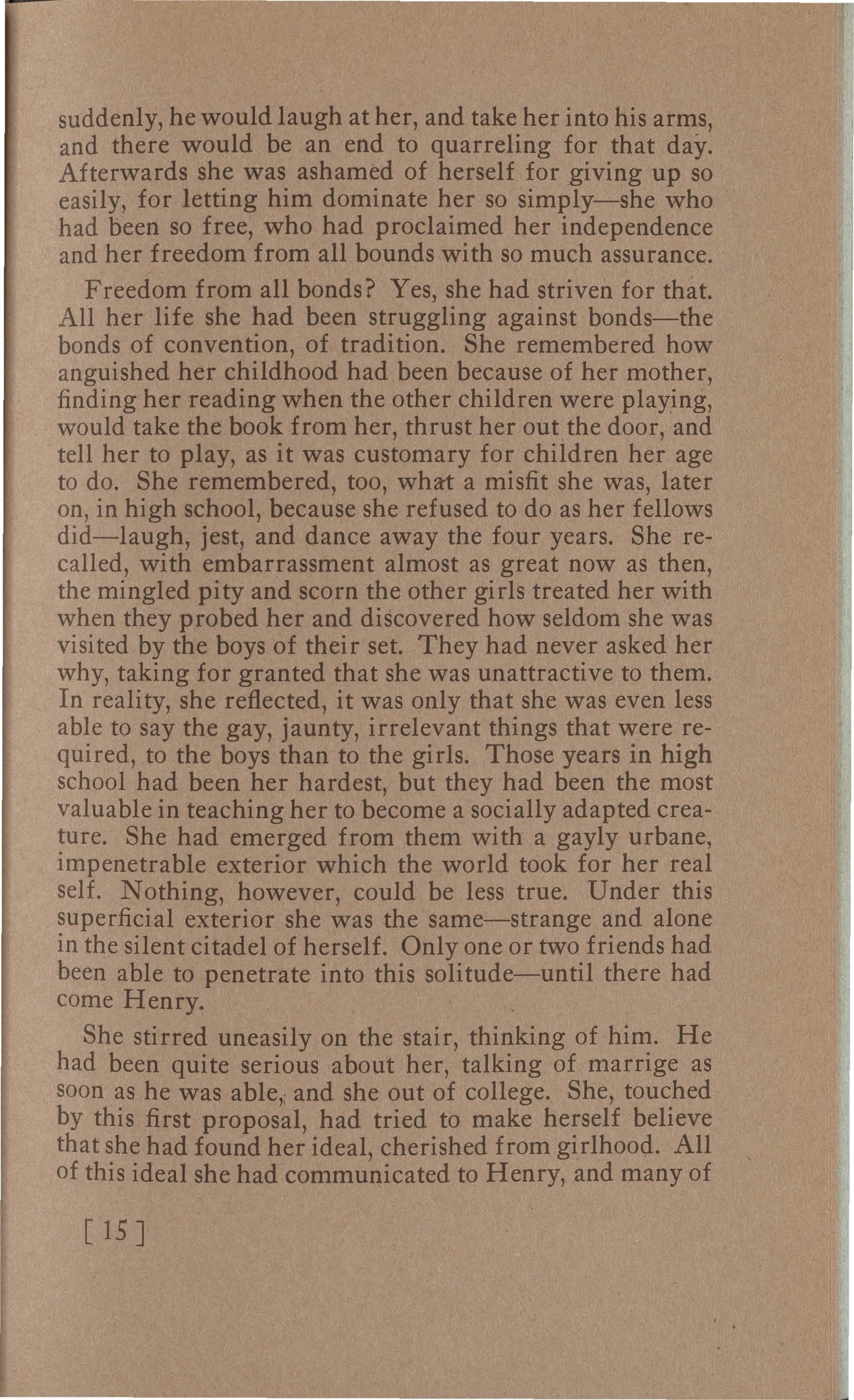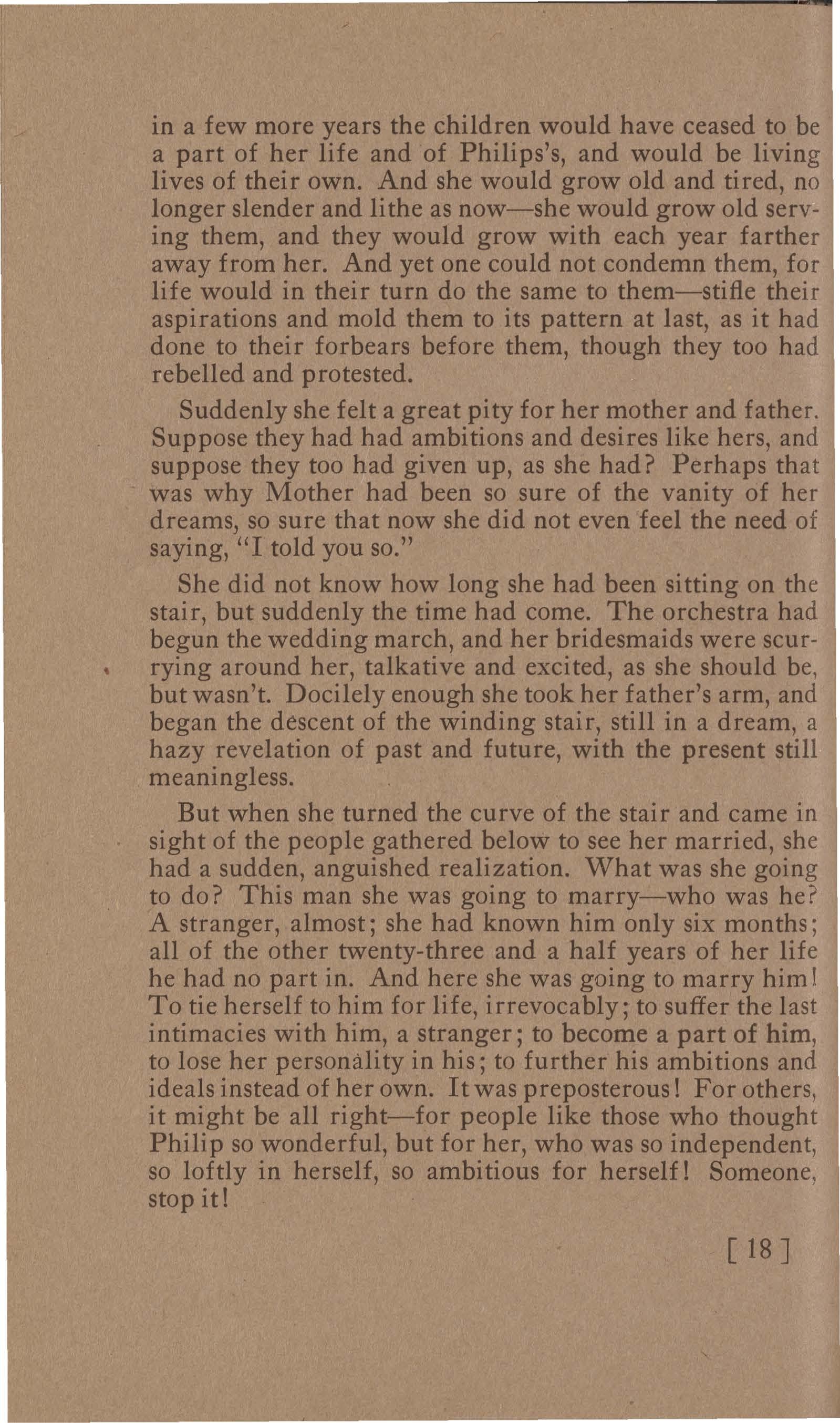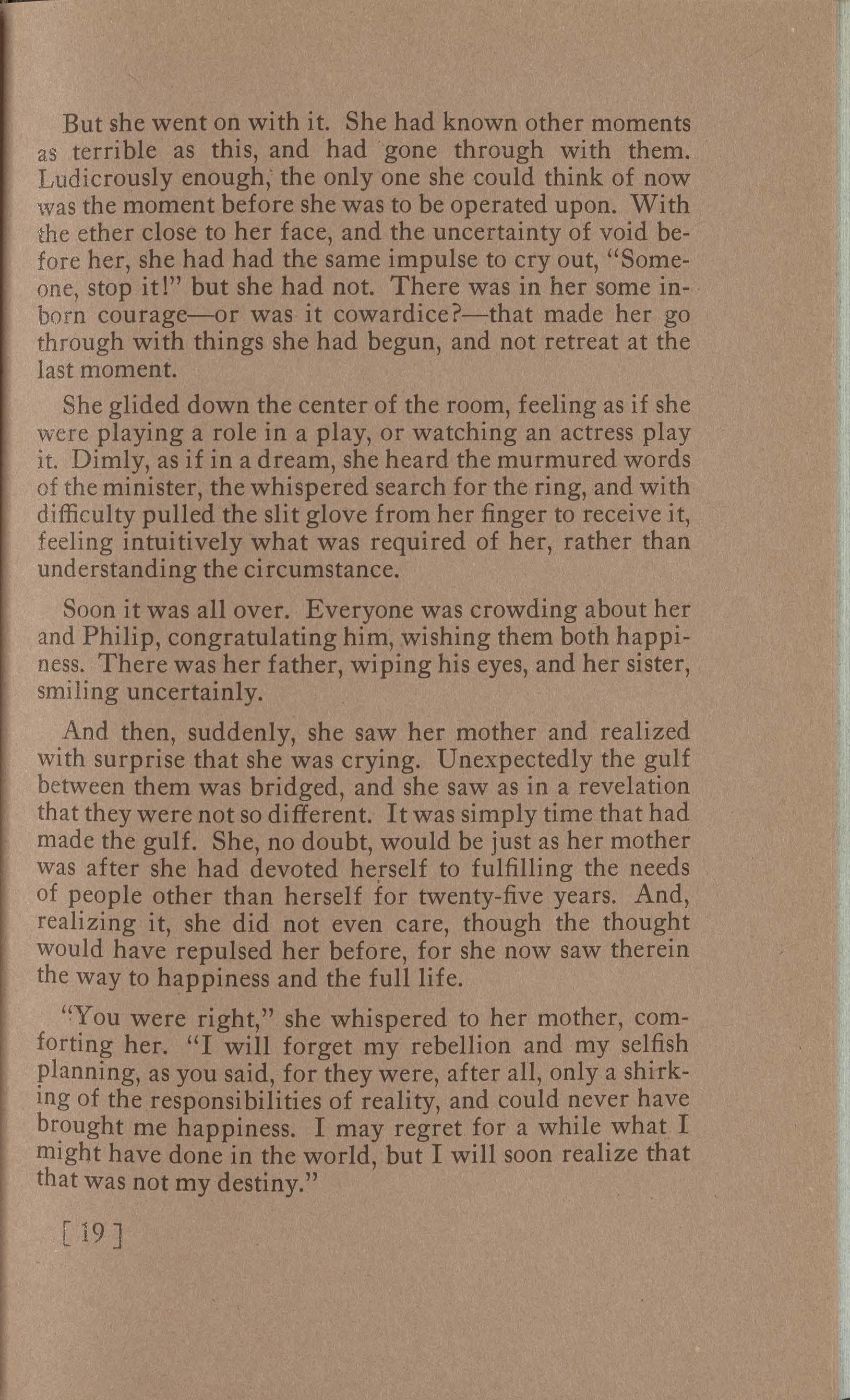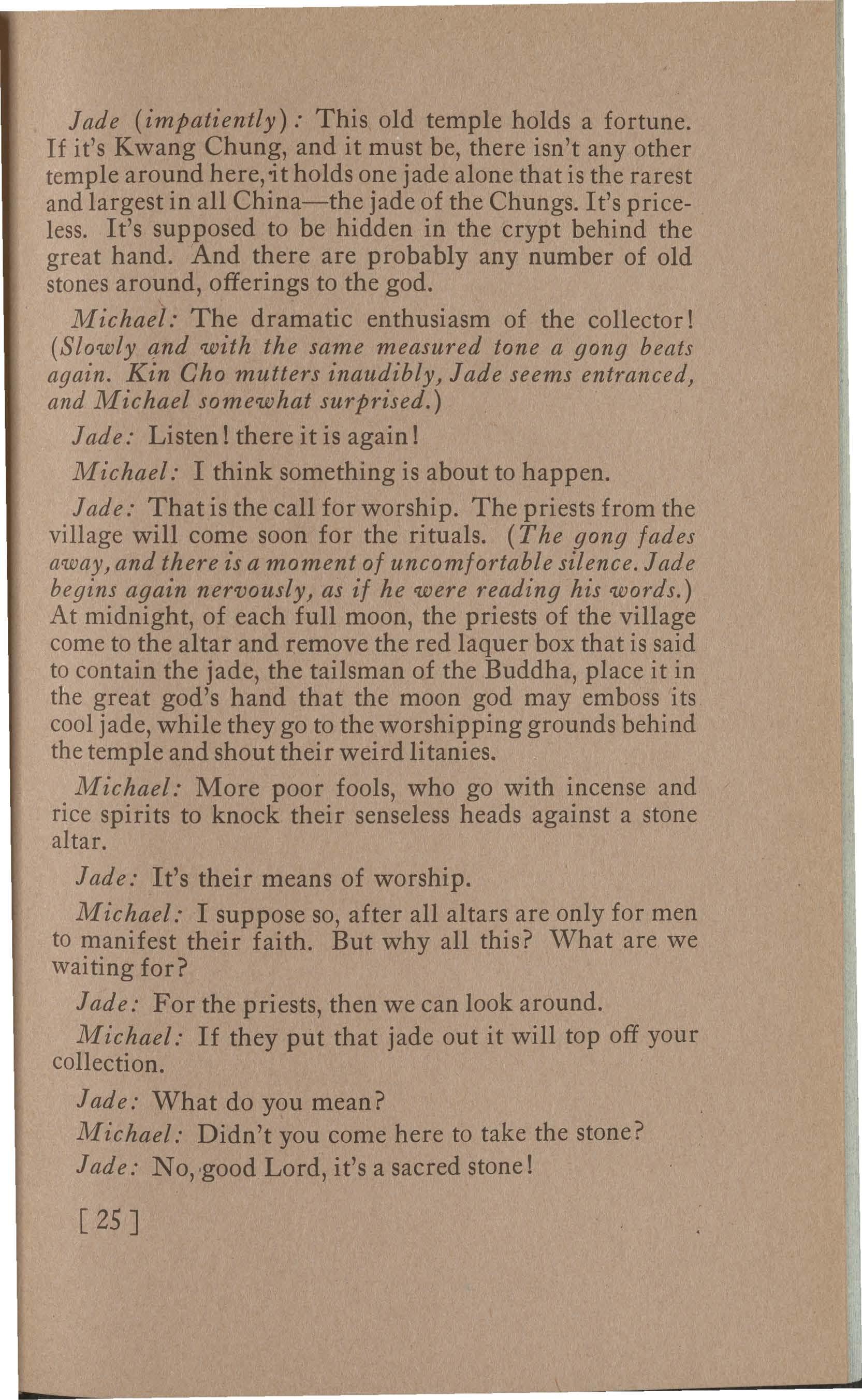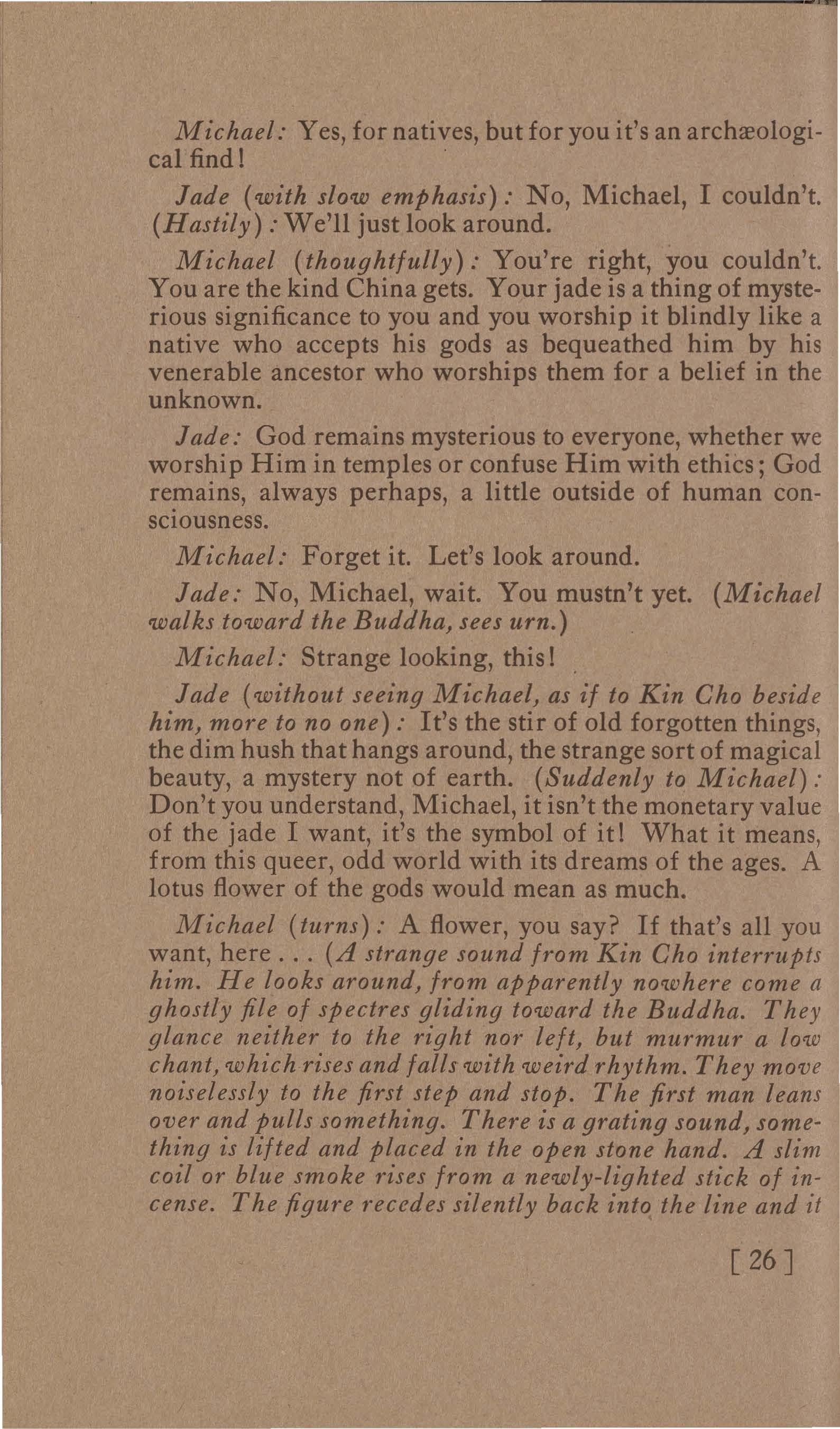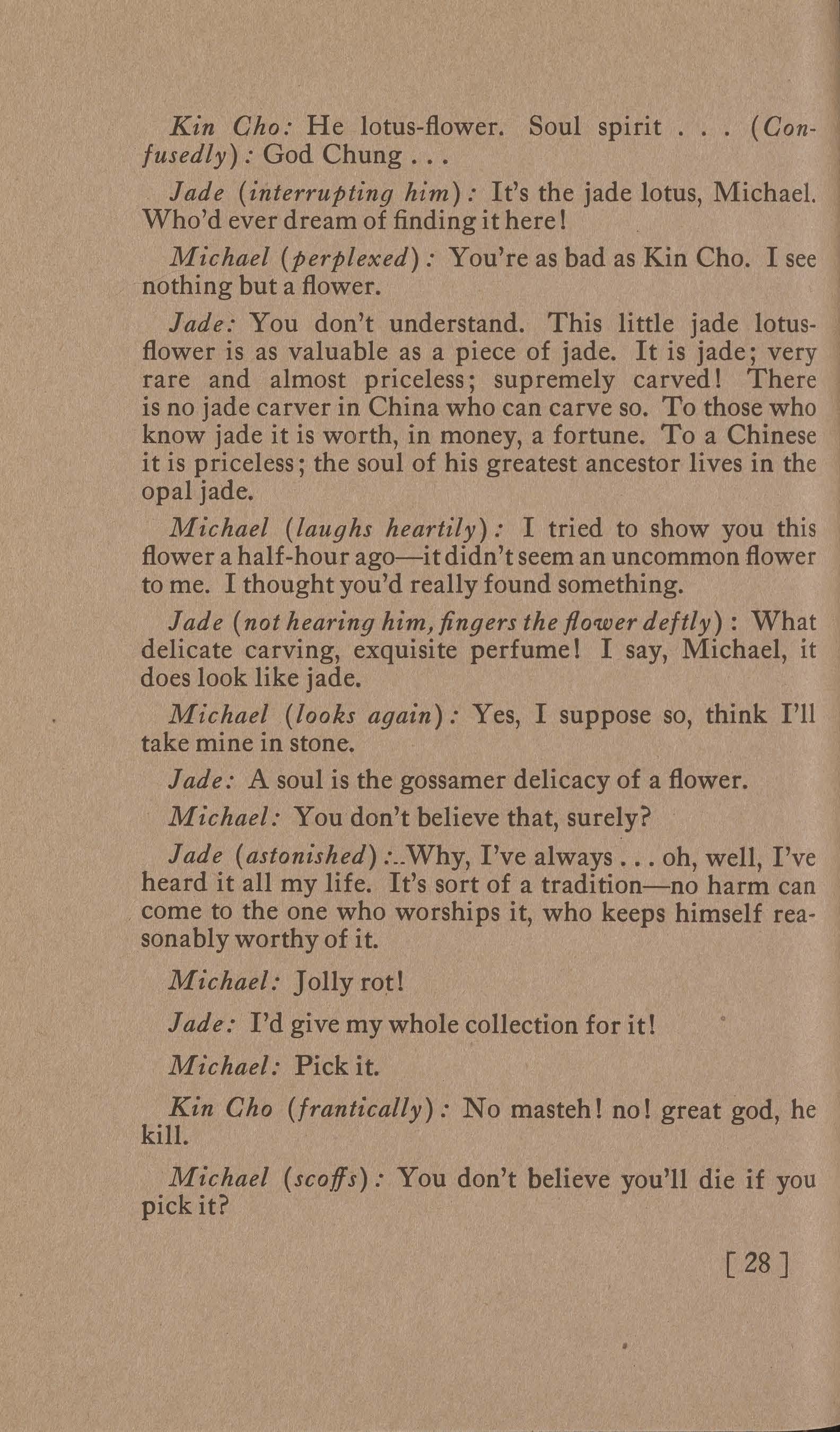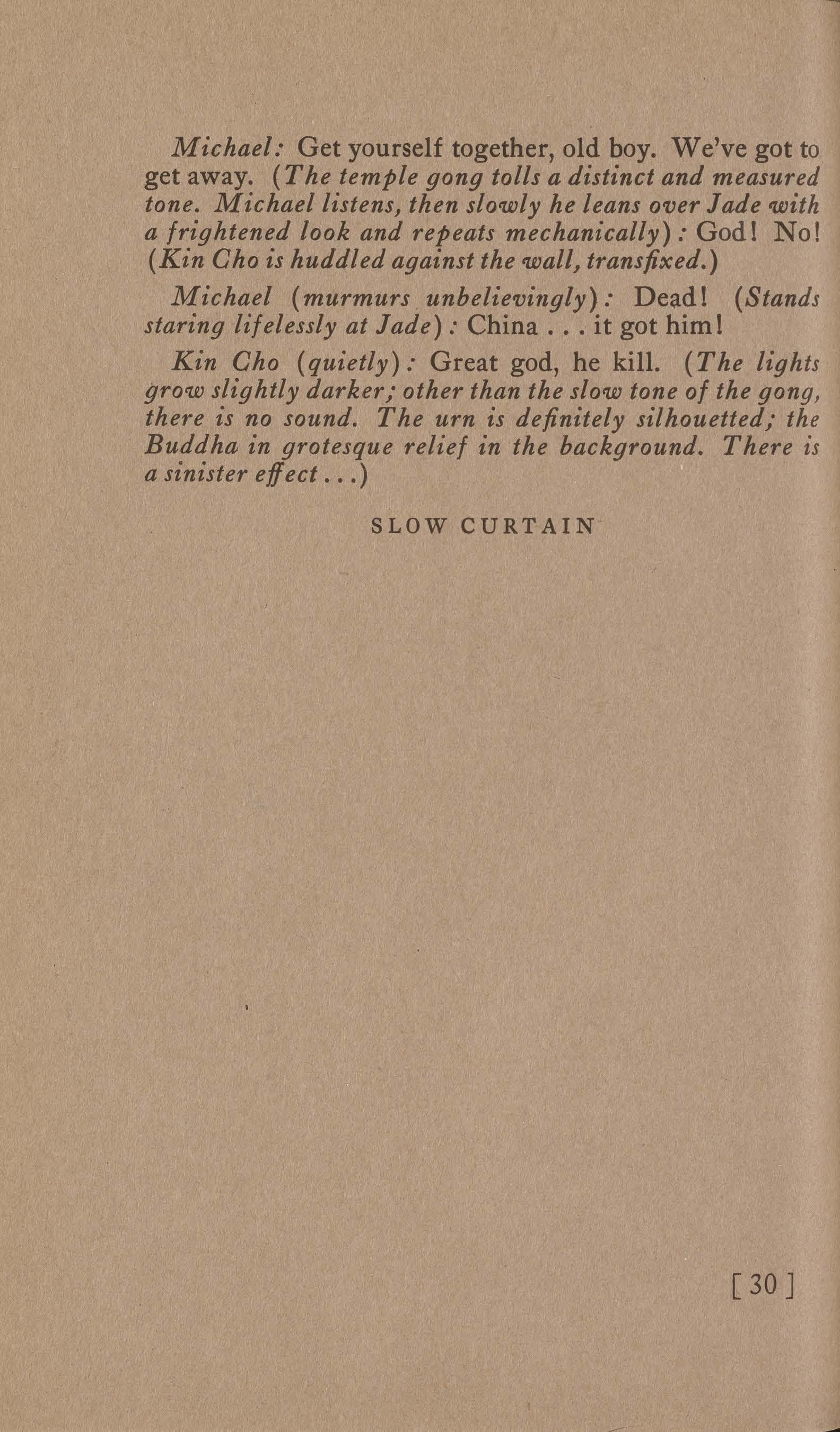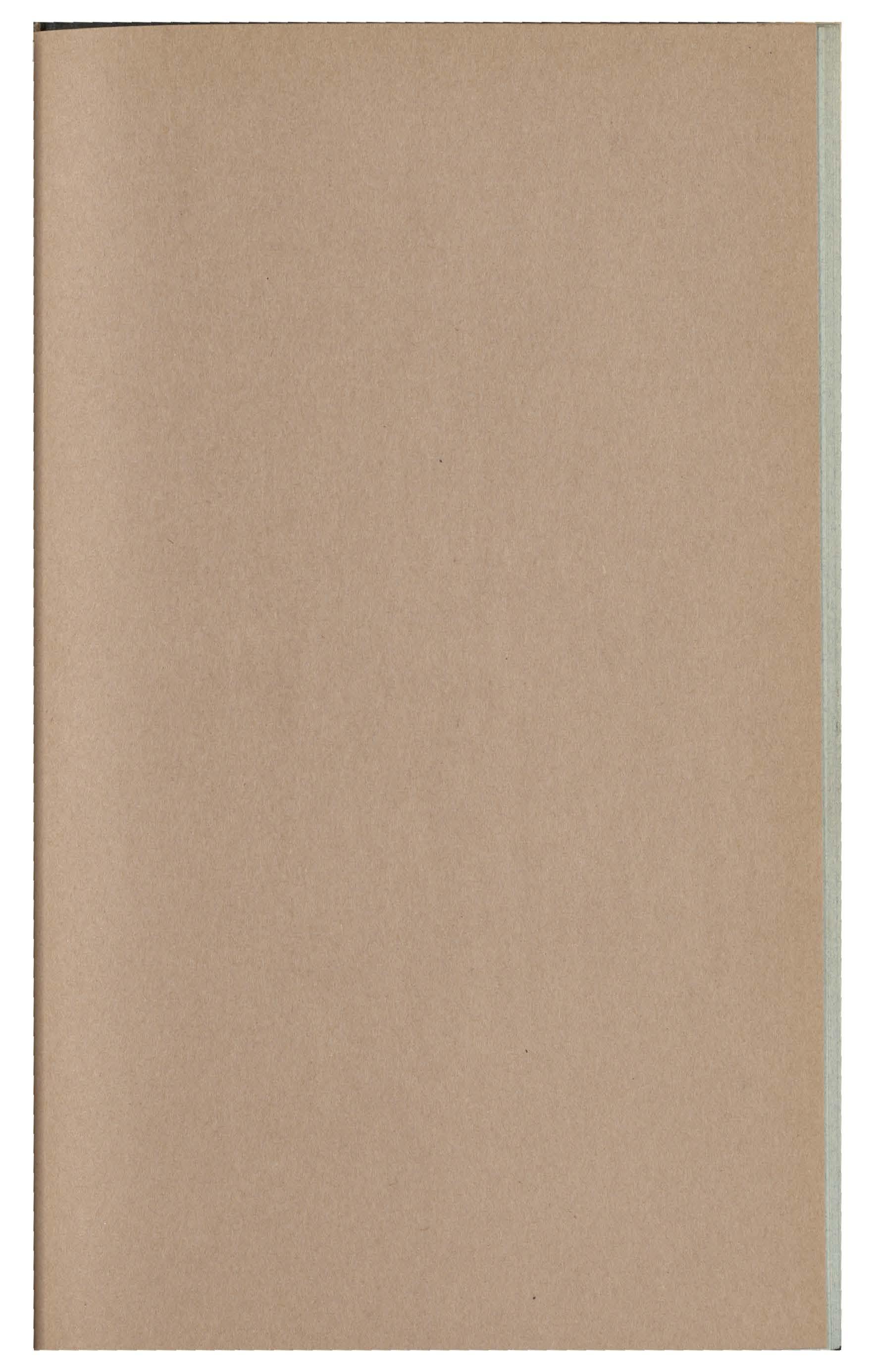The Baby Tower
MARYDEE LOWE
THE bleak Pagoda stood a lonely sentinel on the stony mountain crest and its jagged edges, silhouetted against the brilliant Chinese sky, cut the blue as a dull instrument. They grey monotony of the exterior was broken only by a small black aperture high up above the second story. The stone steps leading to this hole were worn thin by countless stumbling feet, feet cruelly broken and compressed within tight rags. It was a desolate scene; here no hovering courtyard sheltered the single tower from the bitter winds heavy with sand. It was into this tower that the girl babies of China were thrown, useless and hated, and it was known as the Baby Tower.
Many miles from the Tower, in the direction of the Pacific, lay the small city of Chefoo. This was an old Chinese city influenced little by foreign elements. Its narrow streets wound in crooked paths through the shade of the crenelated wall. Thatched houses and boarded shops rose abruptly from the streets in the native eastern section disclosing a stream of humanity · that ebbed with life and eternal motion.
Once the family of Tcheng had lived in the midst of this sordid squalor, had slept on the filthy road, had pounded their garments at the edge of the thick, sluggish river, and had argued loudly in the reeking gambling houses. They were a dull people, satisfied in their poverty, for they knew of no other life.
This was all many years before the days of Tcheng Wan Lai, whose father was a prosperous shipowner. Time had brought foreigners within the high wall of Chefoo and wealth and power to the Tcheng family. It was, therefore, quite fitting that Tcheng Wan Lai should become the bride of Wong Ching, the flourishing merchant of silks and furs. * * *
Tcheng Wan Lai crouched dumbly in a remote corner of her tiny room which was bare but for the three-legged
[7]
stool upon which she sat and a large celluloid doll in front of her. A missionary lady had given her this doll at a meeting she once shyly attended and she had kept it hidden safe from the ridicule of her husband ever since. She loved it and cherished it far above her old treasures of which she had once been so proud.
Tcheng Wan Lai huddled there in stricken stillness and only her pale, cracked lips moved in mumbled curses. She was invoking the wrath of the gods upon Wong Ching, his honorable father, and most venerable grandfather. She hated Wong Ching and all his family with a hatred that seared into her heart and left her gasping. What had she ever done to deserve such ruthless treatment? True, she hadn't given Wong Ching a stalwart, handsome son w o would pay him burial homage and receive well his heritage. It was the gods who were angry, who had cursed her with four useless girls; she was not to blame. Had she not prayed nightly at the feet of the goddess of mercy? Had she not placed rice and sweet cakes daily in the hands of the kitchen gods? She had entreated in vain; the gods were deaf.
Painfully she rose, and crossing the rough floor stood gazing from her latticed window. Below her the familiar courtyard lay bathed in the warm sun of mid-summer. The chrysanthemums made dark red splashes against the ivycovered wall, and the lotus hid their velvet whiteness beneath the shade of the lush spreading leaves.
Her eyes narrowed as she saw Ah Li stretched indolently by the sparkling fountain. The clear water reflected every graceful line of her brightly coloured dress which fitted smoothy in the new fashion, reflected too, the sheen of her hose as far as her knees. Her feet, crudely exposed, were hideous and almost as large as the foreign devils'. Tcheng Wan Lai glanced down at her own tiny feet and rather envied the loose freedom of the other.
That was the girl Wong Ching had chosen to take her place. That young, slim, painted creature was even now occupying her lavish suite, using her perfumes, and wearing her jewels. Ah Li was pretty in a brazen way, but her [8]
beauty couldn't compare to the once fragrant loveliness of Tcheng Wan Lai. Ah Li was only an expensive doll to be pleased and amused for she could neither embroider, nor sew, nor even cook. Wong Ching must certainly despise the sticky rice, the poorly seasoned meats, and the heavy bread that the servants now placed before him. Inevitably he must miss the crisp, flaky cakes that Tcheng Wan Lai had molded herself to tempt his appetite.
Tcheng Wan Lai didn't know how long she'd been standing there at the window looking but not seeing. She only knew that she was suddenly very tired, but the sight of her husband in the gate startled her into realism and she forgot her weariness. How she hated him standing there so straight and handsome, hated his black oily hair and his · exact garments, hated his dark eyes that burned so deeply into the image of his lovely Ah Li as, stepping slowly, he neared the couch with passionate yearning in every movement.
Tcheng Wan Lai, watching, saw, as , slie had seen so many times before, the girl lift a langourous hand in greeting and turn aside to the fountain. It was disgraceful to be thus so disrespectful of her great and powerful lord's presence. Tchen Wan Lai's heart ached as she turned back into the gathering gloom of her little room. Yes, she hated Wong Ching for the anguish he had caused her, · but far deeper she hated that insolent intruder.
Tcheng Wan Lai dropped heavily to her low stool and ·again directed her -mumblings to her only companion, the celluloid baby. Had Tsai Ming, the girl who brought her meagre bowl of rice and pot of tea twice a day, ·told her the truth? Was she to believe from the lips of this ragged slave the words, that would mean her last hope was gone, gone forever? She couldn't believe it, she must know more, but how? She clutched her arms tighter to her throbbing body and swayed back and forth in an agony of dispair.
The gods had their revenge and she had been cast aside, but yet their greed was not satiated. They must have more and still more, they would never stop till they had sucked the last drop from her pulsing veins. If only the gods
[ 9 J
would not favor this child of Ah Li and let it be a despised girl. Let Ah Li be forced to make the long pilgrimage to the Tower; let her arms ache, and let her head seem to be pierced with a thousand sharp splinters. Let her suffer as Tcheng Wan Lai had suffered; four times she had groped on hands and knees up those sunken steps, steps that clung to her as though she had become an infinite part of the inert burden in her arms. Then Tcheng Wan Lai could smile in her secret triumph and again she could hope. The day would not be far off and she could wait.
Summer passed, fall came and went, and the frozen winter of Chefoo was fast marking its path with frozen lips and starved bodies. Tcheng Wan Lai shivered on the hard planks of the floor and clasped her celluloid doll still closer beneath the thin quilts. She dreaded the winter months with their shrill blasts and wet, penetrating cold.
The icy stillness of the night was sharply broken by frantic poundings on the door Tcheng Wan Lai lay huddled in trembling fear; who could it be, who dared to come thus to her room where I entrance was forbidden to all but the slave-girl? The noise was repeated again and again in nervous staccato till Tcheng Wan Lai stiffly got to her feet and limped painfully to the door.
I
In the grey light beyond the crack of the door stood a shivering figure, whose features were a wavering mist in the numbed brain of Tcheng Wan Lai. The old woman stared vacantly brushing quivering fingers across her eyes. Yes, it was Ah Li, who stumbled in a prostrate kowtow at her feet; Ah Li, who was so proud and haughty. Tcheng Wan Lai looked scornfully down into the pleading, beseeching eyes that before had always mocked and taunted. But Ah Li had forgotten aU in her terror, she was only a slight girl about to die and she was afraid of death with its merciless cruelty. Sobbing she held out to Tcheng Wan Lai the bundle in her arms; her child was a girl. Wong Ching had not spared her in his terrible wrath, but sent her out in the freezing night to the road that meant certain disaster.
[ 10]
The dawn crept late into the dark room of Tcheng Wan Lai and the long hours of the night were over. She glanced quizzically at the bundle by her side; it moved and from within the folds she heard a muffled cry. She was filled with a great happiness and no longer did she feel the fierce hatred eating out her heart. Old Tcheng Wan Lai had forgiven.
Torment
BEVERLEY BATES
In the garden, flowers-but oh, I hear A cold wind blowing harshly, and I fear
That it is cruel, for above it all I can feel the flowers crushed against the wall.
[ 11 J
LI A Y
TY OF RfCHMO VIRGI IA
Requiem
SuE CooK McCLURE
Though I shall die
At last, and soon, I shall not fail the sky: Death shall make a mountain -floe
My sarcophagus of snow, A length of cloud
My winding shroud, And set at feet and head
The sun and moon, Candles to watch the dead.
Her Wedding Day
SuE CooK McCLURE /
DowNSTAIRS the violins were tuning up. Sitting on the step above the curved landing, she could hear them, · indistinctly, as from a great distance. La, la, la I someone drummed on the p~ano, and the violins answered back, squeaking discordantly at first, and then gradually melting into clear harmonies. An opening door sent up to her with a current of air the scent of flowers which she knew were placed in every possible corner. They gave her home a strange, alien look, as it had worn once before in her life, when her grandfather had died, and the rooms had been piled high with wreaths and banks of blossoms. She still remembered her grief, , too poignant for a child-she had dreamed horrible dreams for days afterwards.
How strange it had been that her grandfather had had to die then-he had meant all to her that her father should have meant, and hadn't. If he had lived, she probably would not have this strange, apart feeling-the feeling that she was sitting at distance, removed and detached, watching men and women go through scenes as in a play, never touching her, the inmost part of her, or even meaning anything vital to her. She realized that she had had this feeling for years, and still had it today-her wedding day. In fact, she had never been so detached as today, this day to which she had looked forward all her life, and had dreamed about, thinking that then her mind and spirit that stood aloof would come near, drawn by an interest that obscured self. But here she was, feeling as distant as ever, listening to the babble below as disinterestedly as if the preparations were for an outsider, not for her.
She often wondered-and had wondered ever since she had known Philip, why it was she was going to marry him. When she was alone, she saw clearly all his fine little defects that escaped the eyes of others, especially the eyes of the women who admired him-the slight crook in his nose, the stubby black shoes he wore, so like everyone's else, the [ 13 J
spoilt lines of his mouth. She supposed it was this admiration of other women for him that had finally decided her. She had always valued what other people esteemedclothes, houses, dogs, and now husbands.
Of course, when she was with him, he was able to make her forget all his petty faults. His easy possessiveness, his boyishness at times, and his intense seriousness at others, forced her to forget them. His eyes, too, were so beautiful -the kind of eyes she would have like to have had, and hadn't. And his smile was so lovable-she could forget all that she didn't like about him when he smiled.
But when he was gone she could not forget them, and she had been miserable because she could not love him completely enough to do so. She had always thought of love as something vast, engulfing, a thing that swept you out to sea, forgetful of everything, and unmindful of that left behind. But this wasn't like that at all; it was neither vast nor engulfing. She remembered almost with anguish all the times that Philip had failed her ideal-once he had been confused and at a loss when accosted by a beggar; quite often he misinterpreted what she said; sometimes she felt him subtly disapproving of the little, unconventional things she did for her own love of them-walking bareheaded in the rain, or at night, alone. A law unto herself, she hated interference or disapproval from anyone. She knew that Philip would be subtly disapproving now, if he knew what she was doing. What conventional bride ever finished dressing fifteen minutes before the ceremony, and calmly sat down alone on the steps to watch the preparations below!
Everything they had ever done together, every word they had ever spoken to each other, came to her mind now, like the acts of a play she might have seen. Sometimes there had been almost perfect days that they had spent together, when they understood each other, and all was right with them and with the world. But there had also been times when they had quarreled. bitterly, and had found themselves utterly at odds on important questions or on subjects that one thought important and not the other. But then, [ 14]
suddenly, he would laugh at her, and take her into his arms, and there would be an end to quarreling for that day. Afterwards she was ashamed of herself for giving up so easily, for letting him dominate her so simply-she who had been so free, who had proclaimed her independence and her freedom from all bounds with so much assurance.
Freedom from all bonds? Yes, she had striven for that. All her life she had been struggling against bonds-the bonds of convention, of tradition. She remembered how anguished her childhood had been because of her mother, finding her reading when the other children were playing, would take the book from her, thrust her out the door, and tell her to play, as it was customary for children her age to do. She remembered, too, what a misfit she was, later on, in high school, because she refused to do as her fellows did-laugh, jest, and dance away the four years. She recalled, with embarrassment almost as great now as then, the mingled pity and scorn the other girls treated her with when they probed her and discovered how seldom she was visited by the boys of their set. They had never asked her why, taking for granted that she was unattractive to them. In reality, she reflected, it was only that she was even less able to say the gay, jaunty, irrelevant things that were required, to the boys than to the girls. Those years in high school had been her hardest, but they had been the most valuable in teaching her to become a socially adapted creature. She had emerged from them with a gayly urbane, impenetrable exterior which the world took for her real self. Nothing, however, could be less true. Under this superficial exterior she was the same-strange and alone in the silent citadel of herself. Only one or two friends had been able to penetrate into this solitude-until there had come Henry.
She stirred uneasily on the stair, thinking of him. He had been quite serious about her, talking of marrige as soon as he was able, : and she out of college. She, touched by this first proposal, had tried to make herself believe that she had found her ideal, cherished from gi,rlhood. All of this ideal she had communicated to Henry, and many of
[ 15]
her thoughts also, which she slowly realized he had not understood-thoughts about living to help the masses of people, and not just living the narrow life of a home and a family. Her fine scorn of the ordinary life he had not sympathized with; in that respect he was quite like Philip. But he, as she, had been eager to travel in foreign lands, and they had spent many hours together, planning visits and homes in all the romantic countries of the world. He had, however, grown angry when she had refused to give up one bit of her college interests to spend more time with him, not understanding why he alone was not sufficient. And so, as the quarrels became more frequent, their understanding vanished, and they drifted from each other.
After that was over, she had been able to finish college with no more interruptions in her work, and had started to teach, unwillingly enough, but knowing there was nothing else so satisfactory when one must have money. Why, she wondered, did one have to have money? The necessity for earning money had spoiled more lives and wrecked more plans than any other one force in the world, she reflected.
At first she had planned, eagerly, to save, in order to travel and take some leisure to write, hoping, vainly enough, she supposed, to reach fame through her pen. But somehow the money trickled through her fingers as soon as it reached them. She was always attracted by lovely clothes, and quite unable to resist them-as well as books that she loved. Altogether, it was quite incredible the way money vanished in a manner impossible to account foryet the fact of its vanishing remained.
And so, at twenty-four, suddenly taking stock of herself, she had realized that she had done nothing she had planned to do, that she was still as far from her goals as before, and that she was slowly but certainly descending into that rut which so many people fall into, mistaking it for security. She had been in the despondent state caused by the realization of this when Philip had appeared, and she was induced to do that which, six years earlier, she had sworn not to do until she had reached some, at least, of her goals.
[ 16]
Downstairs, she heard her mother giving last minute orders in a business~like, matter-of-fact voice. Her mother had always been business-like and matter-of-fact, and this had caused the gulf between them. Her mother had scoffed at her sincerely voiced intentions to "do something more than just marrying and raising a family-to do something that would help the whole world." Mother had laughed at her when, goaded by her family's staidness, she had declared, in a shaky voice, her intention to break away, to live, as soon as possible. This laughter she had not been able to forgive her mother. She had gone away, afterwards, bitter and choked, very near to tears, but too defiant to cry and too ashamed of her own weakness in being made to confess to one so littJe in sympathy with her, her inmost ambitions and desires.
Mother, however, she knew, would not say, "I told you so," because she had been so sure, had actually known all along, that she was going to forget all her ambitions and plans. And this was what was so irritating-to be treated as a child who speaks of things he does not understand. It was Mother, she felt, who had not understood, not she, for she had not forgotten her plans, but still desired their achievement, achingly. She had merely given in-life was too much for her; it was crushing her into following the beaten track, but it was not able to make her follow it willingly. Stubbornly she resolved to write after her marriage, to do something to show that she refused to be buried in housekeeping and children, as so many others had been. But deep inside her, she knew that she would never be able to do it. Philip was only moderately rich, and she would have to do a great deal of her own housework. And children were inevitable. Philip loved them. His ideal of happiness was to live on an old country estate, with dogs and horses and children, in tranquillity and ease until the end of his days.
She saw now more clearly than ever that she would have to spend the rest of her life working to make his ideal come true, while hers sank deeper and deeper into the morass of married life. In a few years there would be children, and
[ 17]
in a few more years the children would have ceased to be a part of her life and of Philips's, and would be living lives of their own. And she would grow old and tired, no longer slender and lithe as now-she would grow old serving them, and they would grow with each year farther away from her. And yet one could not condemn them, for life would in their turn do the same to them-stifle their aspirations and mold them to its pattern at last, as it had done to their forbears before them, though they too had rebelled and protested.
Suddenly she felt a great pity for her mother and father. Suppose they had had ambitions and desires like hers, and suppose they too had given up, as she had? Perhaps that was why Mother had been so sure of the vanity of her dreams, so sure that now she did not even feel the need of saying, "I told you so."
She did not know how long she had been sitting on the stair, but suddenly the time had come. The orchestra had begun the wedding march, and her bridesmaids were scurrying around her, talkative and excited, as she should be, but wasn't. Docilely enough she took her father's arm, and began the descent of the winding stair, still in a dream, a hazy revelation of past and future, with the present still meaningless.
But when she turned the curve of the stair and came in sight of the people gathered below to see her married, she had a sudden, anguished realization. What was she going to do? This man she was going to marry-who was he? A stranger, almost; she had known him only six months ; all of the other twenty-three and a half years of her life he had no part in. And here she was going to marry him! To tie herself to him for life, irrevocably; to suffer the last intimacies with him, a stranger; to become a part of him , to lose her personality in his; to further his ambitions and ideals instead of her own. It was preposterous I For others , it might be all right-for people like those who thought Philip so wonderful, but for her, who was so independent, so loftly in herself, so ambitious for herself I Someone , stop it!
[ 18]
But she went on with it. She had known other moments as terrible as this, and had gone through with them. Ludicrously enough; the only one she could think of now was the moment before she was to be operated upon. With t he ether close to her face, and the uncertainty of void before her, she had had the same impulse to cry out, "Someone, stop it!" but she had not. There was in her some inborn courage-or was it cowardice?-that made her go through with things she had begun, and not retreat at the last moment.
She glided down the center of the room, feeling as if she were playing a role in a play, or watching an actress play it. Dimly, as if in a dream, she heard the murmured words of t he minister, the whispered search for the ring, and with difficulty pulled the slit glove from her finger to receive it, feeling intuitively what was required of her, rather than understanding the circumstance.
Soon it was all over. Everyone was crowding about her and Philip, congratulating him, wishing them both happiness. There was her father, wiping his eyes, and her sister, smiling uncertainly.
And then, suddenly, she saw her mother and realized with surprise that she was crying. Unexpectedly the gulf between them was bridged, and she saw as in a revelation that they were not so different. It was simply time that had made the gulf. She, no doubt, would be just as her mother was after she had devoted he,rself to fulfilling the needs of people other than herself for twenty-five years. And, realizing it, she did not even care, though the thought would have repulsed her before, for she now saw therein the way to happiness and the full life.
'iYou were right," she whispered to her mother, comforting her. "I will forget my rebellion and my selfish planning, as you said, for they were, after all, only a shirkmg of the responsibilities of reality, and could never have br_ought me happiness. I may regret for a while what I might have done in the world, but I will soon realize that that was not my destiny."
[ 19 J
She felt somehow that this did not sound so happy, but in reality she was radiantly happy, as happy as she had ever been. All her life she had been struggling against established things, and had known that happiness could not be found in rebellion, but had been willing to pay the price. Now she felt that everything in the world was ordered and right, that the established order was the best. Like a pattern laid out on a sewing table she saw the plan of human life before her-to live, bear and raise good children, and die. For the first time in her life she felt that to do this would be to do a noble thing-to bear strong sons to carry on life and name through the far years. In this was eternity, the only form of infinity that finite things could know, the only reality that would not turn to dust in the grasp; and with the realization of the nobility of this pattern, and acceptance of it, there came peace and happiness, such as there should be.
She felt, with a rush, a great love for everything, for everyone. They were all so wise with living much, and they knew that now her life was coming to fulfillment and peace. They were glad-glad for her. She would have liked to embrace them all, in her happiness, and tell them how right the plan of things was, and how happy she was in accepting it.
Instead she looked up, and smiled at Philip, standing tall beside her, her husband. [ 20]
21 J
Through the Dark Gap
BEVERLEY BATES
I open my window, That has shut away the day, And let the night in.
My room is no longer of a house; It is cool and strange With the solemn singing of the night.
T hru the dark gap of my window I can feel the stars.
(A Play in One Act)
LOUISE DINWIDDIE
DRAMATIS PERSONAE
Jade-a young collector, traveling in the Orient with Michael-an indifferent observer, Kin Cho-their coolie. Worshippers.
Time: Near midnight, on an August evening. Place: The Orient.
SCENE I
The inner courtyard of the Kwang Chung shrine. It is moonlight; small, odd figures are revealed amid the ruins of a temple. In back center, raised on a platform of stone, relieved with jade, is the colossal figure of a Buddha. The bamboo trees on either side blacken the stage with jagged silhouettes and the silver green light brings into clear relief the broad, flat features of the immense figure. In front the Buddha is a carved urn, from which grows a delicate green flower. Occasionally thru the stillness is the distant sound of sweet-toned gongs, which fade mysteriously away into the silence again.
(The curtain rises on an empty stage. A temple gong is heard faintly. There are voices; someone exclaims:) Look! a gateway!
Second Voice: Well, I'm glad it's something, after wandering half the night in the wilderness I
Discovered: Entering on right, Kin Cho drawing a shansa with two men seated. in it. He is a young Chinese boy with a sleek yellow-mooned face, and a keen intelligent look. Jade, one of the occupants, is a tall slim chap of about twenty-three. He has a fine, sensitive face, with rather candid and ingenuous eyes. His companion, [ 22]
Michael, is a little below normal height with a short nose and pugnacious chin. His eyes have a wide inquisitive look, and wrinkle as though he is always about to laugh. He is dressed in sport clothes. Kin Cho puts down the bars and steps aside. Bows.
Kin Cho: We here, master.
Jade (jumping down): It's a bit ghostly around here. I think this is the old Kwang Chung shrine. It's around this location, at least.
Michael (gets out slowly, looks about curiously): At least I hope it is I I must confess I appreciate China's temples much better in sunlight. What a place for a temple, in this god-forsaken spot!
Jade (somewhat nervously): Hush I no one must know we're here.
Michael (jesting) : There's no one home. I knocked and they said they'd be back later.
Jade (seriously): It isn't anything to joke about. The Chinese in these uncivilized parts are not so friendly to us "white devils." They resent any intrusion, and especially on sacred territory.
Michael: As I was saying, it's quite all right, we can come some other (He stops abruptly. There is a distinct grating noise, as of metal moving, in the direction of the Buddha. Listen. What is it?
Jade: Idon'tknow,itisfromthetemple. (ABellrings; a low, measured tone.) It's the temple bell, that is the signal for the worshippers. (He looks up.)
Michael: What are you looking for? What is this all about?
Jade: See, the moon's full. It is a custom at midnight of the full moon to bring offerings to the god Buddha. In these isolated temples it is the only time the gates are opened. These shrines have priceless relics in them.
Michael: Personally, I don't care for relics. I've seen enough of your China in six weeks, pushing myself through
[ 23 J
narrow streets with whining beggars and shrieking peddlers; slant-eyed strange people everywhere-as strange to you as you are to them. Much less hunting out temples at midnight, with snaky bamboo trees and crossed-legged idols squatting around in musty ruins I You do like queer things, old man.
Jade: The trouble with you, Michael, is you're bored with China and there's adventure teeming everywhere I You need to feel the spell of China.
Michael: Spell and China be damned! I'm sick of China and the Chinese. For six weeks I've stayed here to please you, Jade, and because I wanted . to see you. Tramped its winding streets, smelled its-loathesome smells, suffered its smiling, sleek and slant-eyed inhabitants, and even lived beneath convoluted roofs with grimacing devils ... but I don't like it, old boy. I'm just an Englishman in China.
Jade: Go on, what you need is a hobby. It makes life interesting in a place like this.
Michael (sardonically): Collecting?
Jade: Yes (as if speaking to himself) •• , jade.
Michael: That's your heritage. You began with the name.
Jade: And what a name to handicap an infant with I
Michael: Your father collected, Jade, all of his life. It was only logical pe should give it to you, whom he loved above all others, that you should carry it on. Besides it's born in you, the love for all this, China and her endless mystery. (Laughing at himself.) Ye gods, I'm getting almost poetic I
Jade (dreamily) : Yes, China ... and the mystery of the East. ( Quite suddenly with enthusiasm) : And it's all here, Michael, that's why I brought you. I want you to feel China, you've never felt it. I ...
Michael ( interrupting him with a laugh): Oh, yes, I feel China has a reputation for tea I
[ 24]
Jade (impatiently): This old temple holds a fortune. If it's Kwang Chung, and it must be, there isn't any other temple around here, it holds one jade alone that is the rarest and largest in all China-the jade of the Chungs. It's priceless. It's supposed to be hidden in the crypt behind the great hand. And there are probably any number of old stones around, offerings to the god.
Michael: The dramatic enthusiasm of the collector! (Slowly and with the same measured tone a gong beats again. Kin Cho mutters inaudibly, Jade seems entranced, and Michael somewhat surprised.)
Jade: Listen I there it is again l
Michael: I think something is about to happen.
Jade: That is the call for worship. The priests from the village will come soon for the rituals. (The gong fades away, and there is a moment of uncomfortable silence.Jade begins again nervously, as if he were reading his words.) At midnight, of each full moon, the priests of the village come to the altar and remove the red laquer box that is said to contain the jade, the tailsman of the Buddha, place it in tne great god's hand that the moon god may emboss its cool jade, while they go to the worshipping grounds behind the temple and shout their weird litanies.
Michael: More poor fools, who go with incense and rice spirits to knock their senseless heads against a stone altar.
Jade: It's their means of worship.
Michael: I suppose so, after all altars are only for men to manifest their faith. But why all this? What are we waiting for?
lade: For the priests, then we can look around.
Michael: If they put that jade out it will top off your collection.
lade: What do you mean?
Michael: Didn't you come here to take the stone?
lade: No,,good Lord, it's a sacred stone!
[ 25 J
Michael: Yes, for natives, but for you it's an arch::eological find 1 ·
Jade (with slow emphasis}: No, Michael, I couldn't. (Hastily): We'll just look around.
Michael (thoughtfully): You're right, you couldn't. You are the kind China gets. Your jade is a thing of mysterious significance to you and you worship it blindly like a native who accepts his gods as bequeathed him by his venerable ancestor who worships them for a belief in the unknown.
Jade: God remains mysterious to everyone, whether we worship Him in temples or confuse Him with ethics; God remains, always perhaps, a little outside of human consc10usness.
Michael: Forget it. Let's look around.
Jade: No, Michael, wait. You mustn't yet. (Michael walks toward the Buddha, sees urn.)
Michael: Strange looking, this 1 .
Jade (without seeing Michael, as if to Kin Cho besid e him, more to no one): It's the stir of old forgotten things , the dim hush that hangs around, the strange sort of magical beauty, a mystery not of earth. (Suddenly to Michael) : Don't you understand, Michael, it isn't the monetary value of the jade I want, it's the symbol of it! vVhat it means , from this queer, odd world with its dreams of the ages. A lotus flower of the gods would mean as much.
Michael (turns): A flower, you say? If that's all you want, here ... (A strange sound from Kin Cho interrupts him. He looks around, from apparently no'1.vherecome a ghostly file of spectres gliding toward the Buddha. They glance neither to the right nor left, but murmur a low chant, which rises and falls with weird rhythm. They move noiselessly to the first step and stop. The first man leans over and pulls something. There is a grating sound, something is lifted and placed in the open stone hand. A slim coil or blue smoke rises from a newly-lighted stick of incense. The figure recedes silently back into the line and it [ 26 J
moves mechanically toward the urn in the center. Before i t they stop and bow slowly, then move toward the Buddha again and pass out of sight behind it. The gong sounds again ... Michael seems uncommonly interested, Jade stands entranced as a statue, Kin Cho bowing at his side.)
Michael: Gad, they're ghostly things 1
Jade ( in a hoarse whisper); I wonder why they stopped before the urn?
Michael (indifferently): Probably bowing to the ashes of some venerable ancestor.
Jade (softly): It's all so still and strangely silent tonight. There's an element of time's endlessness ...
Michael: Evidently you think so from the time you spend hanging around this place. Forget the fantasies and let's look around and get going.
Jade (startled into reality again): Yes, we must, and be gone before they return. (He goes immediately toward the urn, Kin Cho stays close to him. Michael goes toward the Buddha.)
Michael: You said the jade was up here.
Jade: Yes, a moment-I wanted to see why they stopped here. (Again from the still-the gong rings. Jade unconsciously jumps. Michael sees him.)
Michael: The jade will be enough to see; come on. This place is getting you. You're the kind that China gets.
Jade: Rot! (AcryfromKinChoattractsbothJadeand Michael.)
Kin Cho ( bowing strangely before the urn, muttering_): Lotus-jade! Masteh, lotus-jade! (Jade hurries to him, looks in the urn and calls.)
lade: Michael, come here! (Michael runs to them, utterly bewildered at seeing nothing but a small flower.)
Michael: In the name of idols, what is it? I don't see anything but a flower! (Kin Cho, with great animation, begins to tell something.)
[ 27]
Kin Cho: He lotus-flower. Soul spirit ... ( Confusedly): God Chung ...
Jade (interrupting him): It's the jade lotus, Michael. Who'd ever dream of finding it here!
Michael (perplexed): You're as bad as Kin Cho. I see nothing but a flower.
Jade: You don't understand. This little jade lotusflower is as valuable as a piece of jade. It is jade; very rare and almost priceless; supremely carved I There is no jade carver in China who can carve so. To those who know jade it is worth, in money, a fortune. To a Chinese it is priceless; the soul of his greatest ancestor lives in the opal jade.
Michael (laughs heartily): I tried to show you this flower a half-hour ago-it didn't seem an uncommon flower to me. I thought you'd really found something.
Jade (not hearing him,fingers the flower deftly): What delicate carving, exquisite perfume! I say, Michael, it does look like jade.
Michael (looks again): Yes, I suppose so, think I'll take mine in stone.
Jade: A soul is the gossamer delicacy of a flower.
Michael: You don't believe that, surely?
Jade (astonished) : Why, I've always ... oh, well, I've heard it all my life. It's sort of a tradition-no harm can come to the one who worships it, who keeps himself reasonably worthy of it.
Michael: Jolly rot!
Jade: I'd give my whole collection for it I
Michael: Pick it.
Kin Cho (frantically): No masteh! no! great god, he kill.
Michael (scoffs): You don't believe you'll die if you pick it? [ 28]
Jade ( weak/ y) : No, of course, not ... I'd rather leave it there. (The chant of the worshippers is heard faintly; there are repeated the low tones of the gong. Michael notices Jade staring fixidly at nothing.)
Michael: If that gong keeps up, you'll soon be hypnotized.
Jade (fascinated by the weird effect): It's like the underlying mystery in things, it holds the essence of life ... the hidden meaning of this thing called life, that keeps slipping away while you try to understand it.
Michael (taking him by the arm): Come on, old man, you've had enough. China's too much for you.
Jade (vehemently); Ifl don't try to get it-it will gothe flower-the symbol-the jade. I must have it. Michael, you know I might never see another.
Kin Cho (terrified): He pick it-he dies. (Appealing to Jade): No!
Jade: Take him away. (Turns again to the urn and stands staring fixedly, he seems to see something, and draws back as if something makes him hesitate. The faint chant is heard, increased in tone as if the spectres draw nearer.)
Michael ( without looking at Jade leads Kin Cho down toward left stage): Come on, Jade, they're coming back. They musn't find us here. (To Kin Cho) ; We might die then, for trespassing sacred territory.
lade (still looking at the flower attempts nervously to pull himself together): The desire of a lifetime, only to pick I ( Quickly he reaches toward the urn, looks around him, then picks the flower; simultaneously the gong sounds again, a low ghostly tone. The chant rises. Jade starts away, holding the flower; it appears slightly drooped. Suddenly Jade stops, stares at the flower, shrieks.)
lade: God! Nol (Crumbles to the ground. _Michael turns sharply and runs to Jade; leans over; tries to get him up.)
[ 29]
Michael: Get yourself together, old boy. We've got to get away. (The temple gong tolls a distinct and measured tone. Michael listens, then slowly he leans over Jade with a frightened look and repeats mechanically): God! No! (Kin Cho is huddled against the wall, transfixed.)
Michael (murmurs unbelievingly): Dead! (Stands staring lifelessly at Jade): China ... it got him!
Kin Cho (quietly}: Great god, he kill. (The lights grow slightly darker; other than the slow tone of the gong, there is no sound. The urn is definitely silhouetted; the Buddha in grotesque relief in the background. There is a sinister effect ... )
SLOW CURTAIN
